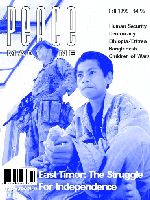
Peace Magazine Fall 1999, page 29. Some rights reserved.
Search for other articles by Humanitarian Times here
Action Contre La Faim Book 1999, Paris, (http://www.puf-lib.com)
This is a review of 11 country cases where hunger and death result from long-term armed conflict, trade sanctions and political standoffs. Action Against Hunger (ACF), draws together staff analyses on the social, political, and historical dynamics of food crises in program areas including Sierra Leone, Iraq, Rwanda, Burundi, Sudan, Somalia, North Korea, Afghanistan, and Burma. ACF pinpoints the varying roadblocks to humanitarian aid. For example, in Burundi, the government authorities limit expatriate movement, civilian access to food, and the maintenance of 24-hour nutrition rehabilitation centers. In Sudan, ACF was forced to leave by the rebel faction (SPLA) for researching the protracted malnutrition among the population who were taxed and forcibly recruited by the rebels. ACF also notes the disorganization of food aid in Sudan: "aid is misused for political purposes." A significant proportion of aid and medicine goes straight to the soldiers.
In North Korea, as well, food resources are channeled to the government and the military. In what ACF calls "extortion diplomacy," food aid donors bail out the financially bankrupt North Korean government. "As long as charitable organizations do not adopt a common line of conduct by refusing to play the regime's game, the regime will play off rivalries; rivalries between NGOs and donors alike, so as to continue to receive aid, despite the often obscure use of food and medicine from the international community."
Review from the Humanitarian Times